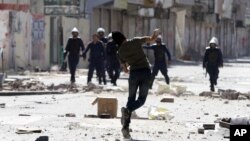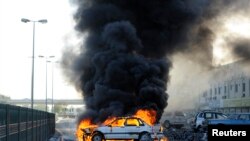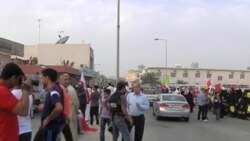DUBAI, U.A.E. —
A teenage boy has died in clashes between protesters and security forces in Bahrain as the Gulf kingdom marks two years of civil unrest. According to witnesses, 16-year-old Hussain Al-Jaziri was fatally wounded by shotgun fire in the village of Daih on Thursday morning.
The boy was one of hundreds of protesters who took to the streets at dawn on the second anniversary of the Shi’ite-led uprising against the nation's Sunni-dominated government.
Authorities have promised a full investigation into the teenager’s death. "It is so sad that we have lost a citizen, but believe me, police are not there to kill anybody, police are there only to control law and order," said Anwar Abdulrahman, the editor-in-chief of the pro-government newspaper Akhbar Al Khaleej.
Altercations between protesters and security forces have become commonplace in Bahrain, which is home to the U.S. Navy’s Fifth Fleet.
According to the International Federation for Human Rights, at least 80 people have been killed in what has become the longest running uprising of the so-called “Arab Spring.”
Bahrain’s Shi’ite majority accuse their Sunni rulers of discrimination and have been pushing for more rights and a greater political voice in the country. But slow reform and political deadlock have led some government opponents to resort to more violent tactics and demand the ouster of the monarchy.
In an effort to resolve the impasse, opposition groups this week took part in government-sponsored reconciliation talks, which will continue indefinitely.
Hard-line Shi’ite groups oppose the dialogue, as it is not aimed at removing the monarchy. But Salman al-Jalahma from Bahrain’s Information Affairs Authority says the dialogue is a significant step forward. “We are very optimistic and so far the initial response has been very positive, so we are excited," he said.
Opposition groups, however, have voiced frustration at the government’s refusal to enter the discussions directly.
Related video report by Carla Babb
On the anniversary of Bahrain’s uprising, Jalal Fairooz from the opposition al-Wefaq party says few people in the country believe the dialogue will result in positive change. "In general we can see, unfortunately, that people are not optimistic. They are rather dismayed and disappointed much more than last year, and that’s why this year we have much more people in the streets," he said.
Al-Wefaq has called for a major rally outside the capital Manama on Friday, the traditional day of protesting in Bahrain.
The underground February 14 Revolution Youth Coalition has also urged sympathizers to march to the original epicenter of the protest movement, the former Pearl Roundabout, which has since been turned into a restricted military zone.
The boy was one of hundreds of protesters who took to the streets at dawn on the second anniversary of the Shi’ite-led uprising against the nation's Sunni-dominated government.
Authorities have promised a full investigation into the teenager’s death. "It is so sad that we have lost a citizen, but believe me, police are not there to kill anybody, police are there only to control law and order," said Anwar Abdulrahman, the editor-in-chief of the pro-government newspaper Akhbar Al Khaleej.
Altercations between protesters and security forces have become commonplace in Bahrain, which is home to the U.S. Navy’s Fifth Fleet.
According to the International Federation for Human Rights, at least 80 people have been killed in what has become the longest running uprising of the so-called “Arab Spring.”
Bahrain’s Shi’ite majority accuse their Sunni rulers of discrimination and have been pushing for more rights and a greater political voice in the country. But slow reform and political deadlock have led some government opponents to resort to more violent tactics and demand the ouster of the monarchy.
In an effort to resolve the impasse, opposition groups this week took part in government-sponsored reconciliation talks, which will continue indefinitely.
Hard-line Shi’ite groups oppose the dialogue, as it is not aimed at removing the monarchy. But Salman al-Jalahma from Bahrain’s Information Affairs Authority says the dialogue is a significant step forward. “We are very optimistic and so far the initial response has been very positive, so we are excited," he said.
Opposition groups, however, have voiced frustration at the government’s refusal to enter the discussions directly.
Related video report by Carla Babb
On the anniversary of Bahrain’s uprising, Jalal Fairooz from the opposition al-Wefaq party says few people in the country believe the dialogue will result in positive change. "In general we can see, unfortunately, that people are not optimistic. They are rather dismayed and disappointed much more than last year, and that’s why this year we have much more people in the streets," he said.
Al-Wefaq has called for a major rally outside the capital Manama on Friday, the traditional day of protesting in Bahrain.
The underground February 14 Revolution Youth Coalition has also urged sympathizers to march to the original epicenter of the protest movement, the former Pearl Roundabout, which has since been turned into a restricted military zone.







